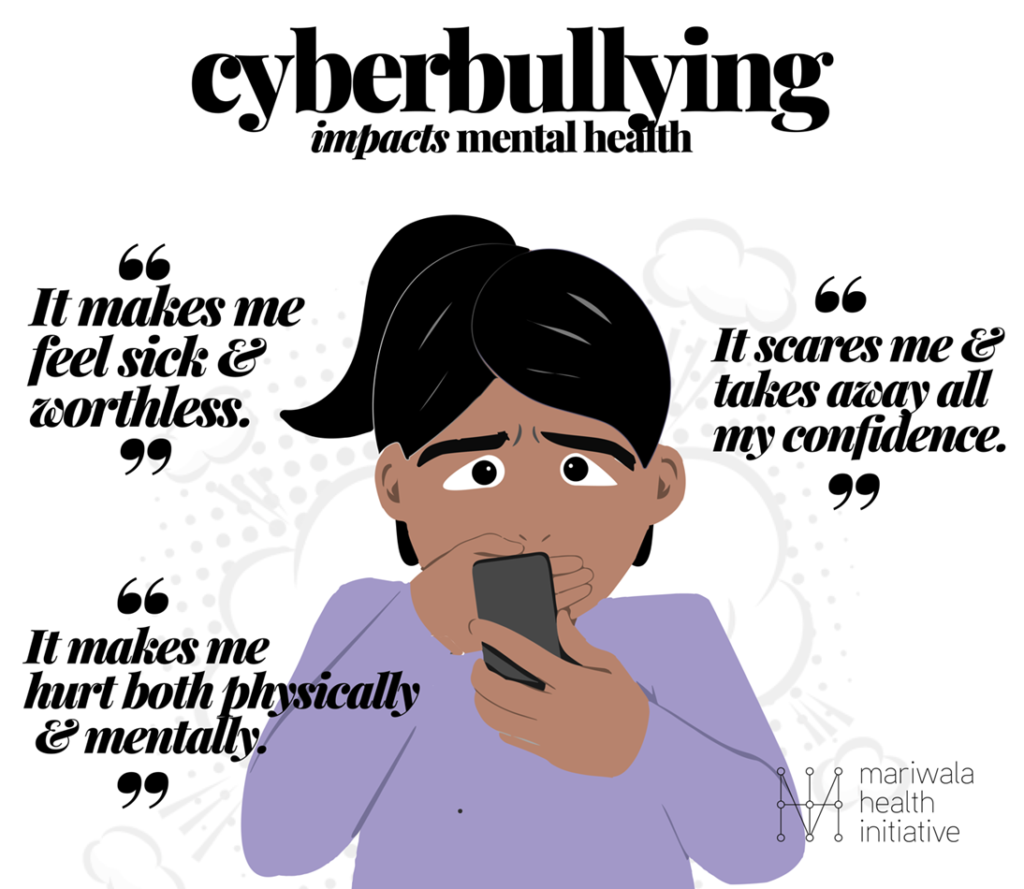BULLYING IN CYBERBULLYING
WHAT IS CYBERBULLYING?
Cyberbullying is a type of bullying that occurs on digital platforms such as social media, messaging apps, gaming platforms, and mobile phones. It is defined by repetitive actions meant to frighten, anger, or embarrass the individual being targeted. Cyberbullying includes spreading lies or rumors about someone on social media, posting humiliating images or videos of someone online, sending harsh or abusive messages, and impersonating someone online.
"Never be bullied into silence. Never allow yourself to be made a victim. Accept no one's definition of your life; define yourself."
- HARVEY FEIRSTEIN
HOW CAN CYBERBULLYING IMPACT THE MENTAL HEALTH OF MY SELF?
- Elevated anxiety and stress levels
- Increased risks of depression
- Reduced self-esteem
- Social withdrawal
- Concentration issue
HOW TO COMMUNICATE THE VICTIM OF CYBERBULLYING?
If a student is being bullied online, it is critical that they do not respond to any posts or interactions, no matter how untrue or rude they were. Remember that a bully's goal is to provoke a reaction. When the victim responds, cyberbullies are pleased, which worsens the situation. Students should not seek revenge because it could land them in serious legal trouble or irritate the bully even more. Attempts to exact revenge on the bully weaken the debate and do not resolve the issue at hand.If you are worried, look for some of these indicators that a student was a victim of cyberbullying:
HOW CAN I REPORT CYBERBULLYING ?
If you or your child are being bullied online, it can be extremely frightening. You may be worried that a friend is being harassed. Remember, no one has the right to make you feel frightened. Put an end to the bullying by taking steps to cut off communication. Then you can notify the authorities and the school. You can also report abuse to various social media platforms. Finally, find ways to deal with bullying by relieving stress and feeling safe.
Send a message to the bully, telling him to stop. Ascertain that the bully understands that what they have done is inappropriate. This is unlikely to stop the bullying, but it will assist you in making your case to the authorities. Remember to save the message.
- Keep your message brief and to the point. Write, "Please do not contact me again. I will report any emails, texts, phone calls, messages, or social media posts from you."
- Avoid using profanity, name-calling, or all caps.
- Put your phone down or step away from your device. If necessary, take a walk around the block to cool off.
- Take screenshots of the bully's electronic communications. Save them to your computer or phone in a file.
"People don't realize how badly verbal harassment and cyber bullying affects you. I wish they had hit me in the face and gotten it over with, because what they said to me, sticks to me to this day. It affected me into the person that I am today. "
- DEMI LOVATO
- how to communicate the victim of cyberbullying - Search (bing.com)
- Helping Students Deal With Cyberbullies | NEA
- cyberbullying quote - Search (bing.com)
- Demi Lovato quote: People don't realize how badly verbal harassment and cyber bullying... (azquotes.com)
- cyberbullying definition - Search (bing.com)
- how to communicate the victim of cyberbullying - Search (bing.com)
- Cyberbullying: What is it and how can you stop it? (apa.org)
- how can i report cyberbullying - Search (bing.com)
- 4 Ways to Report Cyberbullying - wikiHow
- how can i report cyberbullying - Search (bing.com)
- how can i reportberbullying - Bing images



Comments
Post a Comment